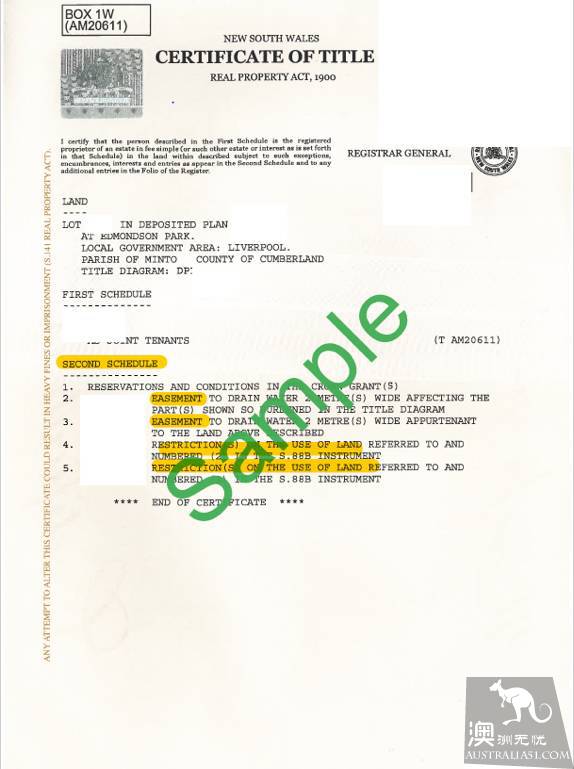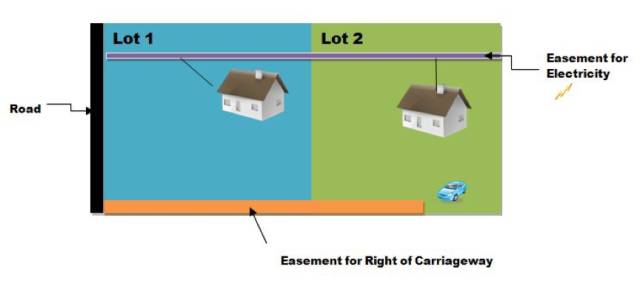大家知道,在澳洲房契是证明对于房产所属权的有力证据。自从澳洲实施Torrenstitle以来,房产转让与权益申领实行注册制。
So in the Land Bureau (a registered lease for Land and PropertyInformation) in the new state) there will be the most important information about the fast-track land: including the name of the owner of the real estate land, (registeredproprietor),. Unique registration number (lot/plannumber) of the land and other registered interest in the land (other registered interest).
We may think that Australia is not all claimed to be privately owned land. How could someone else benefit from a land or house I bought myself? In fact, the concept of private ownership of Australian land is true (except for a few exceptions). However, most of the land is in fact more or less affected by the rights and interests of third parties, and these registered rights and interests will also be clearly written on the lease of each land. So it's important to know clearly that it's important to understand these rights and interests for every buyer.
What is the rights and interests of these people, how large the impact is, will not continue to exist with the land and trade, and we are here to discuss the restriction of the four main rights and interests that the land will suffer under the general circumstances:

(new state lease sample)
Easement (easement)
Easement is one of the most commonly seen encumbrance of land on the lease of a house. Why is it the burden of property, because you can't control 100% of your own land as you want? Private ownership of Australian land, my land should have been my say, you come to my land without my permission I can sue you trespass to land (trespass on the land).
However, if there is a easement, the situation is different. Simply put, easement means that someone else's land has some kind of right to use your land. Easements are divided into two main categories:
Positive easement: such an easement gives the owner of one land a number of rights to go to another person's land. Two of the most common examples are:
Right to pass:
The ZhangSan family's land is behind the Li Si family, and the Zhang San family does not even have a path leading to the main road, the only way is to pass through the Li four house, so Zhang San and Li Si negotiate with Li Si to register a easement. on the land of Li Si. The easement allows Zhang San to use part of the Li Si family's land as an access road from the Li Si family three metres north as a carriageway easement, allows him to use part of the Li Si family's land as an access road to the Zhang San family.

Discharge rights:
The Zhang Sanjia want to drain the (drain water), through the buried pipe at the Li Sijia border. Li Si agreed to pay Zhang Sanjia a sum of money to give the Zhang Sanjia a drainage pipe buried 1.5m wide at the boundary of the Lisijia family to help the (easement to drain water1.5 wide), of the ZhangSan family drain the ground. Of course, easement will also give Zhang San the right to go to Li four to maintain and repair the downpipe.
Negative easement
Positive easement you can see that the main right to enter other people's land. Negative easement does not give access to land, it is a right to limit the land can not do something.
A very typical one is: Li Sijia is a line of sea-view land, unobscured invincible sea view. Zhang three belong to the second-line sea view, the house in Li four behind the land, whether there is a sea view depends entirely on how high the four Li houses. So in order for Zhang San to also have invincible scenery and land value of the house, Zhang San and Li Si signed a negative easement on the land of the Li Si family, demanding that Li Si's land could not be built more than a few meters high. So Zhang San through this kind of easement to protect their own land interests.
So will easement continue with the land transfer? Usually it will. Because easement's rights are attached to the land and will not go with people. So whoever later buys the land will be affected by the existence of a registered easement.
Covenants
Covenants is conceptually similar to a contractual relationship. Similarly, Covenants is formally divided into two types:
Positive covenant
The main formality constrains the owners of the land to do something, and most of the things they encounter are covenant. about maintenance and maintenance. Basically, landowners affected by covenant need to participate in the required maintenance and maintenance.
This maintenance and maintenance is so small that, for example, townhouse families share a drain on the eaves and therefore need to share responsibility for maintenance, which belongs to the private covenant. between homeowners. Big enough to be responsible for the maintenance of some of the main line launching, and this is the covenant. between the council and the
Negative covenant
This is also called restrictive covenant or restrictions on use of land, which basically prescribes what you can't do and what you can't do on land. At most, it appears in newly-developed apartments or land-building projects.
The most common example is the recently developed house package in the northwest of sydney. In many cases, the developer will provide for the choice of the color material at the time of building and the trend towards the house footprint or driveway in order to ensure consistency and overall beauty after the completion of a certain area. These are achieved through the registration of the covenant. In addition, local City Hall, if required for certain land use, will also be attached to the land and the landowners in the form of covenant.

People will ask, so what happens if I don't comply with these covenants requirements? In the event of a breach, interested parties, including city hall, developers and neighbors, have the right to seek compensation by law and to seek injunction. At the same time, it may require that parts of the house that have not been built in accordance with covenant requirements be pushed down and rebuilt.
The question arises, and if one party sells land or property to a third person, will the covenants restrict the third-party buyer in the end? The answer is not necessarily. Because of the limitations of space and too much theory, I do not extend here. You can consult a professional lawyer if you have any questions or if you really encounter the relevant situation.
Caveat
Caveat mentioned this in my previous article on mortgage (see: rejected by banks, opt for private lending? You have to know this! | property Law 39, this is a warning blocking effect.
The aim is to remind potential buyers that a third party has an interest in land or a property that has an interest in (Equitable interest). It also prevents other potential stakeholders from harming the interests of registered caveat (caveator).
For example, in the following cases, a third party may register caveat to your lease:
1. Unregistered lenders lend money to homeowners to purchase land;
2. The buyer signed a contract to purchase the property, but the property has not been transferred before delivery;
3. 期权购买土地下的期权所有人权利;
4. The third party has a contribution to help the owner purchase the house when the property is closed;
5. 与房主签有租约下的租客。
因为本身的警示作用,因此拥有注册caveat在房契上的房产转让或者转卖时,会成为一个需要小心处理的问题。同时,第三人买家也会要求房主先做Withdrawal of caveat,再过户。
Of course, in some cases, caveat has no way to block land transactions, such as property or land itself with bank mortgages, while banks under collateral are generally not affected by caveat.
Mortgage
As the name implies, it's a mortgage. In most cases, the big four banks will act as mortgagors and lenders on the lease. If it is a non-bank loan, the names of other financial institutions or individuals will also be shown on the lease.
一般在房产过户时,都会需要Discharge of Mortgage(解除按揭),这样新的买家才会接受一个没有mortgage存在的土地或者房产。
The above is a simple introduction to the common forms of rights and interests of others on the property rights of houses and land. Of course, you don't have to worry too much about buying a house, and a good real estate lawyer will scrutinize all the things that might affect your rights in the contract and talk to you about it.
Finally, I hope my information can give you some help in understanding Australian real estate.
Counsel: Xiao Yi
Registered Solicitor, Supreme Court of New South Wales
Brightstone Legal 合伙人,悉尼大学法学院毕业
专业领域涉猎产权法、商法与国际投资等

